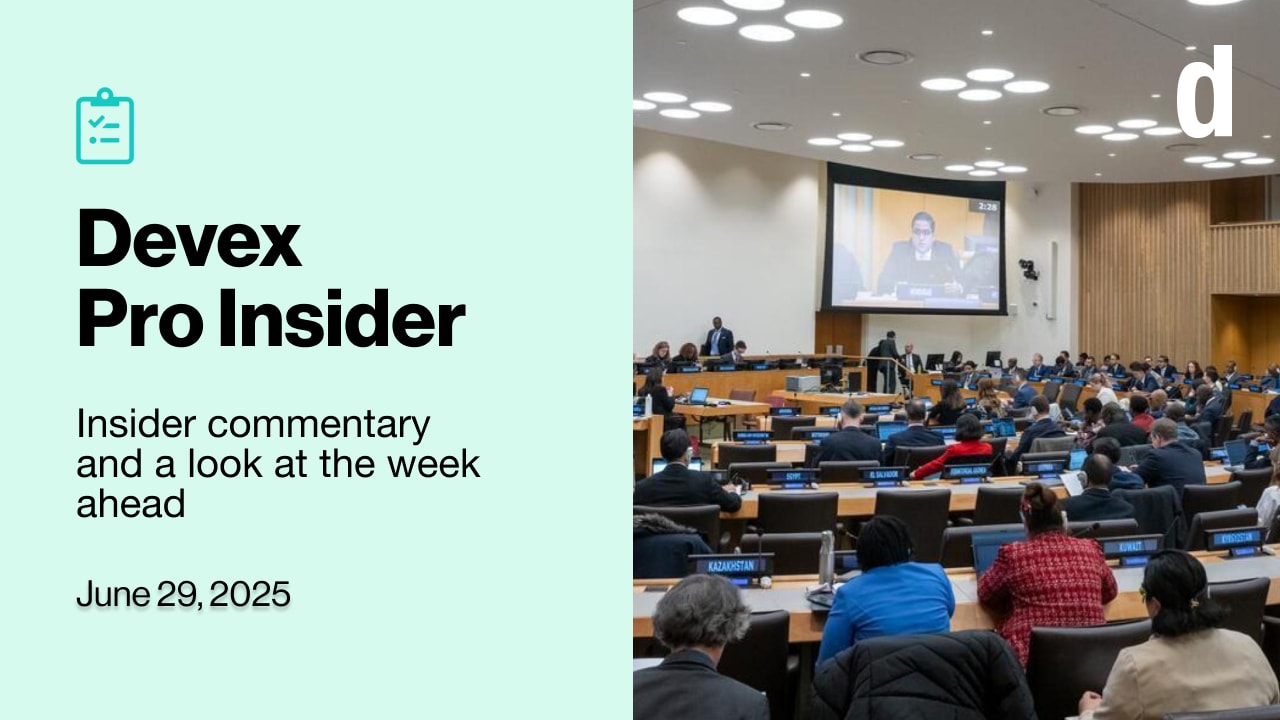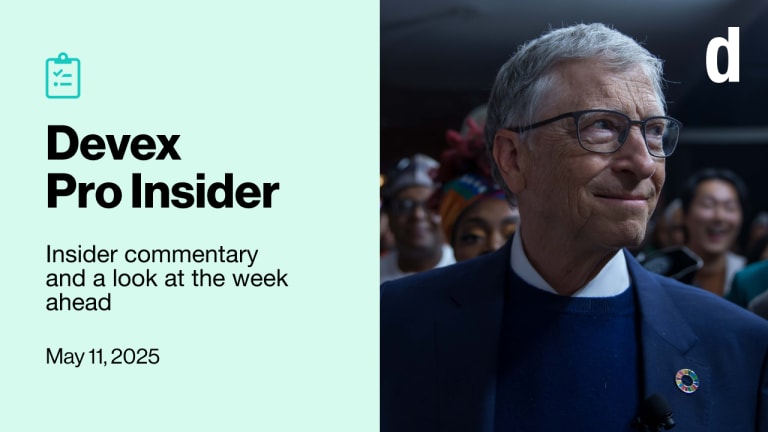Devex Pro Insider: The multibillion US election risk, and sexual misconduct at USAID
The U.S. heads to the polls for an election with global ramifications, an #AidToo story emerges from USAID, and a CEO steps down to make way for global south leadership.
Deep breath. We are now just two days away from a U.S. election that could have significant consequences, not just for those living in the United States but also around the world. It was a subject of much discussion at last week’s Devex World summit. Development experts with ties to the candidates told us that if Donald Trump wins, we can expect to see the aid budget slashed, climate change programs eliminated, and resources shifted from multilateral agencies and INGOs to local and faith-based groups. A victory for Vice President Kamala Harris would mean more continuity with the approach of the previous administration, but she would also bring a focus on private sector investment, multilateral alliances, metrics, and accountability, the experts said. Also on stage, David Beasley, former head of the World Food Programme and a Republican, said, “The rest of the world is looking for America to lead again,” when it comes to addressing global problems, and that even political conservatives can be persuaded of the case for aid through a national interest argument. Meanwhile, over at the United Nations headquarters in New York, my colleague Colum Lynch found a community on edge about the upcoming election. “Are people concerned? Of course, they’re concerned,” said Canada’s U.N. Ambassador Bob Rae. Coming up: Whatever happens this week, join Devex at an election roundtable for Pro members on Nov. 12. Our panel of experts will discuss the outcome and its ramifications for global development — from funding to reproductive rights — and answer your questions. Also in today’s edition: Sexual misconduct at USAID, a controversial change in the world of development recruitment, and a CEO steps down to make way for global south leadership. Bits and pieces #AidToo. While we’re worrying about the USAID of tomorrow, the USAID of today still has problems to deal with. The Office of the Inspector General revealed last week that a former mission director, accused of soliciting services from a “commercial sex ring,” had solicited sex workers while overseas on USAID assignments and left online reviews for dozens of sex workers in the U.S. and abroad. USAID has prohibited the use of sex workers by its staff members since at least 2011, and it became a major subject of discussion in the sector after the Oxfam Haiti scandal of 2018. This case is a reminder that while #AidToo may have fallen out of the headlines, the problems have not gone away. Shared objectives. When Devex Pro members joined us for a conversation with Nisha Biswal, deputy CEO of the U.S. Development Finance Corporation, earlier this year, one of the key issues she talked about was collaboration — how development finance institutions around the world should coordinate to amplify their impact. Well, it seems like action has been taken, because last week a group of 15 European DFIs signed affiliate partnerships with DFC and FinDev Canada to do just that. “By leveraging our strengths in pursuit of shared objectives, DFC and its partners can effectively multiply our impact and reach,” said DFC CEO Scott Nathan. It comes as DFC pushes for reauthorization in order to continue its investment drive, as Nathan told attendees at Devex World last month. An announcement published on DFC’s website said the agreement would offer a chance to crowd in more finance from the private sector. Let’s hope so. It’s been a tough nut to crack so far. Let’s get physical. There’s a new trend in the world of job advertisements. While the specs for manual roles have always included physical requirements, these are now being added to office jobs, too. This has been going on in the corporate sector for the past couple of years and I’ve noticed lately that it’s made its way into global development. Check out this program management role at FHI 360, for example, which requires applicants to be able to “spend long hours looking at [a] computer screen,” to “sit and stand for extended periods of time,” and to “lift/move up to 5 lbs.” Going even further, this strategic communications role with Democracy International says candidates will need to “operate a computer and telephone keyboard,” “reach, stoop or kneel, to adjust computer and/or telephone equipment,” and “specific vision abilities … due to computer work.” Advocates say this kind of detail helps applicants understand the environment they’ll be working in and the precise expectations. But there’s an obvious inclusivity issue here. Even if organizations are open to making accommodations for candidates with disabilities, this type of language could discourage them from applying in the first place. Let me know what you think by replying to this email. ✉️ Do you have insights into any of this week’s bits and pieces? Let me know by replying to this email. Moving on Hans Henri P. Kluge has been nominated for a second five-year term as the World Health Organization’s regional director for Europe, which will begin in February. U.S. Rep. Derek Kilmer, who is set to complete his term in January, will then join The Rockefeller Foundation in the new role of senior vice president for U.S. program and policy, as the organization seeks to deepen its efforts within the U.S. Women for Women International is looking for a new CEO “with roots in the regions in which we program,” which it says is part of its “strategy to shift power and resources and diversify its leadership.” Current CEO Laurel Adams is stepping down in January “to make way for this change.” Carolyn Reynolds, a co-founder of the Pandemic Action Network, is leaving the organization "to take on other opportunities.” She'll remain on the advisory committee. Ebere Okereke is now chief program officer at the Reaching the Last Mile Foundation. Mwanahamisi Singano is now director of policy at the Women's Environment and Development Organization. Did we miss one? Is there a change on the horizon? Let us know at devexpro@devex.com. Devex World As promised, all our coverage from Devex World is now available to Devex Pro members! You can catch up on everything here. To get you started, here are some of my top picks: • Africa wants investment, not aid, says Ndidi Okonkwo Nwuneli, the first African head of the One Campaign. • John Nkengasong, head of PEPFAR, discussed how to win the second phase of the battle against HIV. • Jin Liqun, head of the Asian Infrastructure Investment Bank, says his organization is “politically sensitive” but “apolitical,” amid concerns about Beijing’s influence on the bank. • A group of philanthropy leaders say the goal should be to fund organizations until they are “just big enough,” and then work on a handoff. • In a rare interview, Warren Buffett’s son Howard explains his view on philanthropy. Stat of the week $10.8 billion --— That’s the value of projects approved by the African Development Bank last year — making 2023 its second-biggest year ever, exceeded only by 2009 when it was responding to the global financial crisis. Find out where the money went with our exclusive data analysis for Pro members. Up next World Urban Forum. The U.N.-led conference on sustainable urbanization is taking place this year in Cairo, Egypt, returning to the African continent for the first time in 20 years. Aside from the usual conference sessions, there will be an African ministerial meeting; assemblies for various groups, including local and regional governments, children and youth, and businesses and foundations; and even an urban cinema showcasing community projects from around the world. Nov. 4-8. China’s climate finance. China is emerging as a major player in climate finance, but questions remain about the scope, direction, and effectiveness of its financial support. The Center for Global Development is gathering experts to provide an overview of its funding and what it could mean for the new collective quantified goal, the global climate finance target that will be agreed upon at the upcoming COP29. Nov. 7. The middle-income trap. The World Bank is presenting the main findings of its World Development Report, which focuses on the so-called middle-income trap — the struggle that many developing economies face in moving past middle-income status — and the challenges facing countries that are currently in this situation. Nov. 5. Jobs of the week Looking for your next job? Devex Talent Solutions is currently seeking applications for the following positions: • Division Manager, Editorial and Media Relations, African Development Bank. • Counsel/Senior Counsel, Public Sector Operations, Asian Infrastructure Investment Bank. • Information Technology Officer, Caribbean Development Bank. • Investment Associate/Officer, Global Health, Value for Good. If you have any questions about these roles, I’d be happy to connect you with my colleagues on the recruitment team. If these aren’t right for you, check out more high-level opportunities on the Devex jobs board, which is included with your Devex Pro membership.
Deep breath. We are now just two days away from a U.S. election that could have significant consequences, not just for those living in the United States but also around the world.
It was a subject of much discussion at last week’s Devex World summit. Development experts with ties to the candidates told us that if Donald Trump wins, we can expect to see the aid budget slashed, climate change programs eliminated, and resources shifted from multilateral agencies and INGOs to local and faith-based groups. A victory for Vice President Kamala Harris would mean more continuity with the approach of the previous administration, but she would also bring a focus on private sector investment, multilateral alliances, metrics, and accountability, the experts said.
Also on stage, David Beasley, former head of the World Food Programme and a Republican, said, “The rest of the world is looking for America to lead again,” when it comes to addressing global problems, and that even political conservatives can be persuaded of the case for aid through a national interest argument.
This story is forDevex Promembers
Unlock this story now with a 15-day free trial of Devex Pro.
With a Devex Pro subscription you'll get access to deeper analysis and exclusive insights from our reporters and analysts.
Start my free trialRequest a group subscription Printing articles to share with others is a breach of our terms and conditions and copyright policy. Please use the sharing options on the left side of the article. Devex Pro members may share up to 10 articles per month using the Pro share tool ( ).
Jessica Abrahams is a former editor of Devex Pro. She helped to oversee news, features, data analysis, events, and newsletters for Devex Pro members. Before that, she served as deputy news editor and as an associate editor, with a particular focus on Europe. She has also worked as a writer, researcher, and editor for Prospect magazine, The Telegraph, and Bloomberg News, among other outlets. Based in London, Jessica holds graduate degrees in journalism from City University London and in international relations from Institut Barcelona d’Estudis Internacionals.








